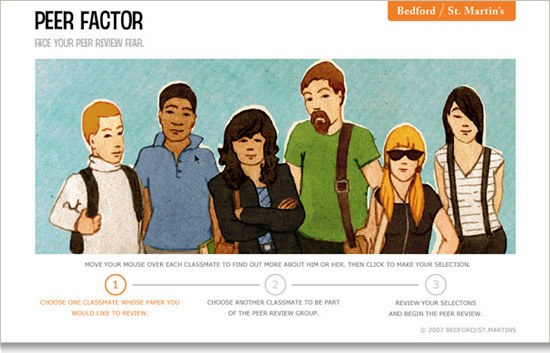Abstract: Enter the Game Factor.
We see the computers and composition community rapidly accepting the idea that using computer games in the classroom can be a very effective way to teach writing. For example, the 2008 program for the Conference on College Composition and Communication included at least 23 presentations that either featured games as their primary topic or recognized that game theory has other applications in the composition classroom. Session titles ran from “Changing Writing, Alternate Realities: Games and Game Theory in the Writing Classroom” to “Constructing Identities/Constructed Identities: Game Work in College Writing Courses” to “Our Avatars, Ourselves: The Rhetoric of Identity in Roleplaying Games.” Additionally, there were two special interest groups (SIGs) devoted to games, and workshops like “Writing Is a Serious Game: Improvisation as Exploration and Performance” seemed focused on bringing the sense of play into the writing process.

Screenshot: peer factor I: Screen shows the cast of characters players choose to participate with.
As a field, our scholarship draws upon game scholars like Huizinga (1955) or Sutton-Smith (1997) (see, for example, Rouzie’s work (2005) on serio-ludic discourse in the composition classroom), or upon new media scholarship to explain how students’ literacies shift in relation to new writing technologies (see Wysocki, Johnson-Eilola, Selfe, and Sirc’s (2004) Writing New Media, for example), but until now there have been few, if any, games designed specifically for the composition classroom that put those theories into practice. In this webtext, we discuss the design and development of a Flash-based game to teach first and second year college students the best practices of peer review.
 ryan m. “rylish” moeller
ryan m. “rylish” moeller
 Kim White
Kim White